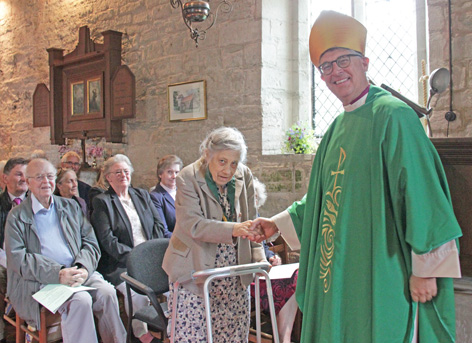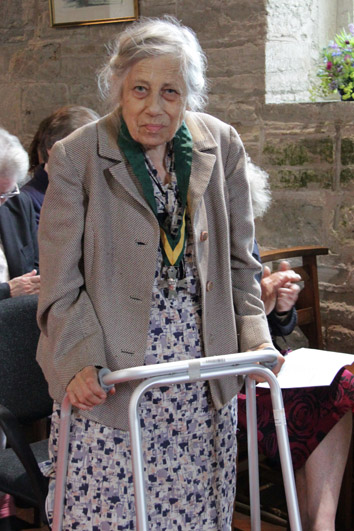 This year’s Cross of St Wulfstan, awarded to individuals who have made an outstanding contribution to the life of the Church in the Diocese of Worcester, has been given to Miss Marian Collins, 92, who for many years has been PCC Secretary and Churchwarden at St Nicholas Church in Dormston.
This year’s Cross of St Wulfstan, awarded to individuals who have made an outstanding contribution to the life of the Church in the Diocese of Worcester, has been given to Miss Marian Collins, 92, who for many years has been PCC Secretary and Churchwarden at St Nicholas Church in Dormston.
The award was presented to her by the Bishop of Dudley, Martin Gorick in a special service on Sunday.
Marian was nominated for the award by the PCC and three former vicars of St Nicholas – Bruce Rienstra, Nick Wright and Greville Cross. All the clergy wrote about Marian’s dedication to the parish where she has lived for her whole life. She was PCC Secretary for over 50 years and churchwarden for almost as long. She also served as ‘verger’ at weddings and Christenings, helping to make arrangements and ensure everything was ready for the clergy. A recent wedding in the church was the first one that Marian hadn’t attended in over 60 years!
 Her nomination statement from the PCC said: “Marian exemplifies more than 50 years of quiet and committed service to St Nicholas Church, Dormston and to her community. She is not one to seek the limelight with dramatic or spectacular action. Much of her contribution has been behind the scenes and humdrum. However, she has devoted her time and energy to getting on with what has to be done. She could be relied upon to know what to do and to see that it was done. Her dedication to her various roles and her steadfastness have been outstanding.”
Her nomination statement from the PCC said: “Marian exemplifies more than 50 years of quiet and committed service to St Nicholas Church, Dormston and to her community. She is not one to seek the limelight with dramatic or spectacular action. Much of her contribution has been behind the scenes and humdrum. However, she has devoted her time and energy to getting on with what has to be done. She could be relied upon to know what to do and to see that it was done. Her dedication to her various roles and her steadfastness have been outstanding.”
Marian said: “I carried out these roles because I felt it was my duty to do so and I’m so pleased to have been recognised for everything I’ve done. I’ve built up a lot of knowledge of the church over the years and have met lots of different people. It’s also lovely to have my family here to support me.”
Bishop Martin said: “I was delighted to be able to award the Cross of St Wulfstan to Marian. It is obvious that she has given many years of faithful service to St Nicholas’ Church and that she is much loved by everyone there. Marian has done the ordinary jobs in the church for decades – we should celebrate the presence of God in these ordinary roles, which together enable us to be God’s extraordinary people in our communities.”
St. Wulfstan/ Wulstan lived c. 1008 - 1095. He served as Bishop of Worcester under the last two Saxon kings and the first two Norman kings. After the Norman Conquest he was responsible for the dismantling of the old Saxon cathedral and the building of a new one, of which the crypt is the main part still surviving today. He was at once venerated as a saint by the people of Worcester, though he was not formally canonized until 1203. Alongside the tomb of St. Oswald, his shrine was a place of pilgrimage until the Reformation. Wulfstan found a special place in local people's affections. He took his pastoral duties very seriously, caring for the poor and preaching widely. He was famed for his healing and prophetic abilities. He even preached against the slave trade in Bristol, then part of his Diocese, and thankfully managed to end this practice for a long while.

